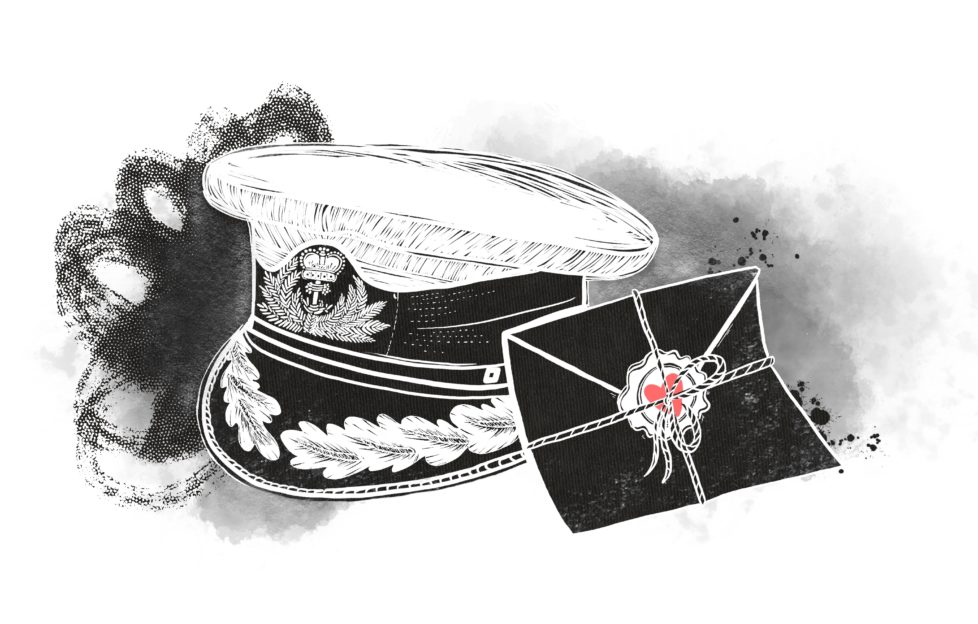
“A Double Wound” by Lewis Brand was first published in the pages of “The People’s Friend” on October 2, 1893.
Lewis Brand was listed as “the author of ‘Vengeance Is Mine’ and ‘The Mills Of God’, &c.”, which certainly piqued our interest.
We’ll be back to the Archives as soon as we can to seek these out!
“Why shouldest thou die before thy time?”
Jack Armstrong was as smart, frank, and merry a lad as ever trod the deck of a British man-of-war, and there was not a creature on board the Spitfire, from the captain to the powder-monkey, and not an acquaintance of Jack’s on shore, but was prepared to join in the chorus —
“We all love Jack.”
There was one, however, a dainty, little Glasgow girl, Isa Dick, that Jack was anxious should detach herself from the common herd of his admirers, drop the plural pronoun of the song, and shyly adopt the singular, singing in her heart, and whispering to him —
“I love Jack.”
Jack at length came to the conclusion that his great desire was being realised, ad with much timidity he ventured to “pop the question”, and received the silent avowal of returned affection, with which many another lover beside himself has got to be content.
Jack was on furlough when he accomplished the great task of “popping the question”, and for a full year thereafter the course of his love seemed to run smoothly enough, for the correspondence of the lovers was regularly sustained on both sides; but having once more reached Glasgow on furlough previous to the sailing of the Spitfire for Chinese waters, he became a little disturbed on discovering the large number of lads with whom she seemed to play fast and loose.
Within a week he had concluded she was like “The Trapper’s Sweetheart” —
“Take a squirrel up a tree,
“Just so frisky, sir, is she:
“Now on this side, now on that,
“You must watch her like a cat.
“It’s ‘No’, it’s ‘Yes,
“I rather guess’ —
“Jest as it may teck her fancy:
“That’s it zackly, that’s my Nancy.”
Like the trapper, he came to the conclusion —
“Whew, a gal’s a cunning thing!
“You must take them on the wing.
. . .
“I’m fur facts, while she’s fur fancy;
“That’s us zackly — me and Nancy.”
Consequently he pressed for immediate marriage, as the Spitfire was likely to remain in Chinese waters for at least three years.
All his blandishments and remonstrances were in vain, however, as Isa firmly refused to be bound to him by the marriage tie as yet, saying it was soon enough to be married after his return.
Hot words followed on both sides; then a reaction set in, and a distinct coldness was displayed by each. But a few days before Jack’s return to his ship, Isa relented much of her obduracy, sought Jack’s forgiveness, renewed her vows to him with every promise of faithful love, mingled with less of lightness and frivolity than she had been recently displaying.
With this Jack had to be satisfied when he left Glasgow to rejoin the Spitfire, which, having been completely overhauled and repaired, was to sail immediately.
When the Spitfire reached her destination the duty of her crew was to watch the Chinese slave junks and piratical Malay prahus.
This every British sailor, who has once learned what these junks and prahus are, does with unflagging zeal; not as might at first be imagined on account of the booty to be obtained, but out of pity for the poor wretches usually imprisoned in the former, and out of something akin to hatred towards the inhuman monsters who man them both.
On board a junk capable of carrying little more than 300, sometimes over 600 slaves, who have been impressed or decoyed on board, are packed amid surroundings of undescribable filth; and there they are kept huddled together either till they die, are purchased by the gambier or pepper planters, or are freed by a British man-of-war.
Cases have been known in which the treatment of the slaves has been such that out of a cargo of 600, at least 250 had died in their confinement.
The knowledge of the misery, then, that these poor wretches endure stimulates our sailors to activity on their behalf.
The Spitfire had been cruising in the China and Yellow Seas for some considerable period before they came across any of the slave junks or piratical prahus, and the men were becoming very impatient, especially as they frequently saw the dead bodies of slaves floating past them, and now and again came across the blackened hull of some small trading vessel that had been plundered and fired by the pirates.
These were unmistakable evidences that both these scourges of that region were very active.
It was not surprising then that one day, while lying near the mouth of the Nankin River, waiting a boat bringing the letters from Shanghai, that, observing a suspicious-looking junk creeping out of the tail-end of one of those dust showers peculiar to that region, the impatience with which the men were waiting news from home should give place to impatience for the chase.
The vessel was moving towards the junk almost before the letters were got on board, and it was clear in a few moments that its movements were observed by those who managed the junk, for the course of the junk instantly changed for flight.
When this was observed by our gallant tars, a ringing British hurrah sped over the waves, as Captain Graham gave orders to clear the decks for action, and to stand by the boats in readiness to lower them.
The fact that flight was attempted satisfied the pursuers that they were at least in sight of a “slaver”.
Under ordinary circumstances there would have been little chance of escape for the junk, but unfortunately the weather was likely to favour them.
As we have said already, the junk was emerging from the tail end of a dust shower, and a renewal of this strange phenomenon was threatening to take place.
These showers consist of a very fine dust, usually yellow, but sometimes black, and are often so dense that even the sun or moon — whichever may be shining at the time — are invisible through it.
The crew of the junk were quick to note the possible renewal of this remarkable freak of nature, and they knew that if they could only keep out of the clutches of their implacable foes till the dust would envelope them, then, in all probability, they might manage to slip away from them altogether.
Take a look at this video of Illustrations Editor Manon creating the fantastic design for this story!
The men-of-warsmen were also quick to recognise these possibilities, and everything was done to gain on the flying junk, but they soon saw that the object of their pursuit was possessed both of remarkable speed and manoeuvring qualities.
At first they could not understand this, but Captain Graham discovered the secret through his glass. It was rigged after the style of an English cutter, and provide with a false keel and shifting weather board. These things made it easy of management and gave it great speed, and both qualities were being taken full advantage of by those on board.
Nevertheless the warship gained ground with considerable rapidity, when a common ruse for retarding the enemy’s speed was resorted to by the junk.
The sailors could see black form after black form being flung into the sea, and left struggling in the dark waters. They knew that the slavers expected their pursuers to stop and lift those wretched victims of Chinese cruelty, but while Captain Graham was loth to let any of the unhappy creatures perish who were struggling in an aimless and hopeless manner in the water, he was determined not to let the miscreants who had thrown them there escape.
In coming to this determination, he knew he was acting on the principle of the greatest good for the greatest number. While he continued the chase, however, he caused a boat to be lowered, and dispatched it to the assistance of those the slavers had thrown overboard.
He was low to open fire on the junk, because he knew that the salves would stand in as great danger as the slavers, but as the dust shower was again slowly gathering in density, he felt compelled to damage the sailing powers of the junk to some extent, so he gave orders for her rigging and top spars to be damaged.
The first shot was a marked success. It carried away the topsail and mast. The second shot dropped the triangular foresail; the third failed to do any damage, but the fourth cut the bowsprit close to the bow.
While some of the slavers were seen to be busy hewing at and clearing away the wreckage, others got out long sweeps, and, altering the course of the junk, endeavoured to pull away at a right angle from the course on which the Spitfire was running.
A worse policy could scarcely have been followed, for another shot from the Spitfire sped along the side of the junk, cutting away the sweeps like a scythe the standing grain.
During the pursuit, the letters had been distributed amongst the men, but so intent were they on the chase that the majority, amongst whom was Jack Armstrong, had thrust whatever communications they had received into the inner pocket of their blouse.
The junk was now so completely disabled that Captain Graham commanded the boats to be lowered, and sent off a boarding party, in which our friend Jack had a place. It was thought that he slavers would yield at once in hope of receiving some mercy, but as the boats approached the junk this idea was dispelled, for some small guns opened fire on the approaching sailors, and the whole crew of the junk were found to be armed to the teeth.
Those who were not engaged working the cannons kept up a fierce but ill-directed fire from a miscellaneous collection of small arms, but the boats of the Spitfire swept on undeterred.
When close to the junk, a new danger presented itself.
The enemy endeavoured to hurl fire-pots into the boats. They were not successful, however, and in a few moments the tars were scaling the bulwarks of the junk in face of a fierce and determined resistance.
Soon the deck was gained, and even the madness of despair was no match for the calm, determined instruments of justice.
The conflict was sharp and short; the deck reeked with a crimson tide, and as the sound of firing and clash of steel slowly died away, they were succeeded by the groans of wounded men, the cheers of victory, and the glad shouts of deliverance that rose up from the recent slaves, as many of them crept up from their pestilential prison, and danced for joy over the prostrate forms of their recent captors.
Scarcely a prisoner was taken, most of the enemy having died fighting, or thrown themselves overboard to perish in the sea.
Two of the tars had been slain, and fully a dozen of them had been wounded more or less severely. Amongst the wounded was Jack Armstrong.
He had observed Lieutenant Rowse engaged in hand-to-hand conflict with the gigantic Chinaman who commanded the junk; and while Lieutenant Rowse possessed in skill and coolness what his opponent had in strength and ferocity, just as Jack observed them his officer slipped in a pool of blood, and would have suffered from a rapid lunge made by his foeman, had not Jack, whose cutlass was already snapped in two, thrown himself between the Chinamen and the Lieutenant and parried the thrust meant for Rowse’s body.
The next moment the Chinaman’s sword had entered Jack’s breast, as he was unable to turn it aside with his broken cutlass. Ere the Chinaman could recover from the thrust he had given Jack, his skull was cloven by Lieutenant Rowse.
To be continued . . .
Part II of “A Double Wound” will appear in next week’s Fiction newsletter.
Click here to read more of our fantastic Fiction content.
Click here to delve into our dramatic Daily Serial.




